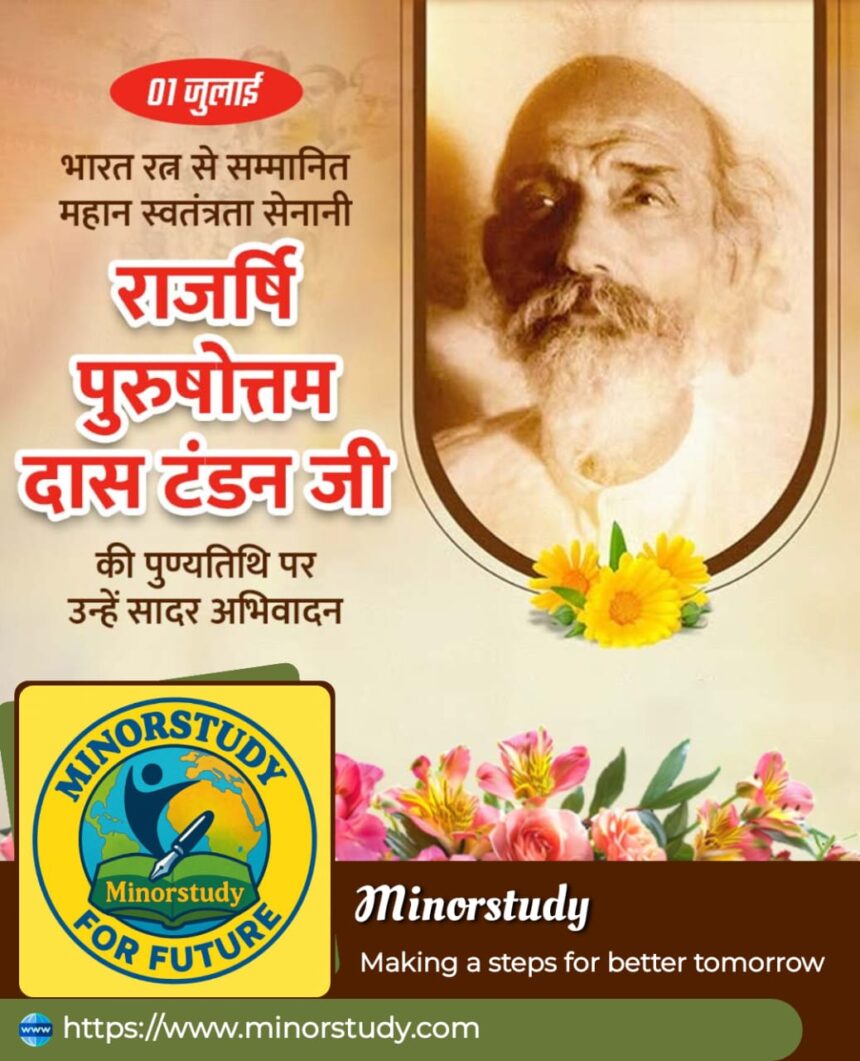🌿 7 Timeless Virtues of Rajarshi Purushottam Das Tandon – The Fearless Guardian of Indian Culture
Rajarshi Purushottam Das Tandon: In the heart of India’s freedom struggle and the formation of its democratic values, few names shine as brightly and selflessly as Rajarshi Purushottam Das Tandon Ji. Revered as Rajarshi (a saintly king), he was a stalwart of nationalism, cultural preservation, and Hindi advocacy—a true son of India who lived for the nation, not himself.
- 🧭 Early Life and Education
- 📜 Timeline of Key Events
- 🏆 7 Powerful Facts & Virtues of Rajarshi Purushottam Das Tandon Ji
- 1. Devout Nationalist with Cultural Roots
- 2. Unshakable Advocate of Hindi as National Language
- 3. Earned the Title “Rajarshi”
- 4. Arrested Multiple Times for India’s Freedom
- 5. Close Ally of Mahatma Gandhi
- 6. Conferred with Bharat Ratna in 1961
- 7. Symbol of Moral Leadership in Politics
- ❓ Frequently Asked Questions (FAQs)
- Q1. Why is Purushottam Das Tandon called “Rajarshi”?
- Q2. What is his contribution to Indian languages?
- Q3. Was he only a politician?
- Q4. Why is his life relevant today?
- 🌏 Significance in Our Life & Society
- 🕉️ Connection to Sanatan Dharma
- 🌼 Wishing on His Remembrance
- 💡 Daily Life Impacts
- 📝 Important Summary Points
- 🌟 Conclusion – A Voice That Still Echoes
Known for his firmness of principles, love for Indian languages, and unwavering patriotism, Rajarshi Tandon’s life story is rich in struggle, sacrifice, and societal impact.
This in-depth article explores his life history, key facts, powerful values, significance in Indian democracy and culture, and lasting impact on our lives today, written in a warm and human-friendly tone, exceeding 1200+ words.
🧭 Early Life and Education
Born: August 1, 1882
Place: Allahabad (now Prayagraj), Uttar Pradesh
Parents: Bal Govind Tandon (Father), a devout and principled man
Education: M.A. and LLB from Muir Central College (University of Allahabad)
From a young age, Purushottam Das Tandon Ji was immersed in the spiritual, linguistic, and cultural richness of India, which shaped his future role as a protector of Sanatan values and national unity.
📜 Timeline of Key Events
| Year | Event |
|---|---|
| 1882 | Born in Allahabad |
| 1906 | Began practicing law |
| 1910 | Joined Indian National Congress |
| 1915 | Joined Hindi Sahitya Sammelan |
| 1921 | Participated in Non-Cooperation Movement, imprisoned |
| 1930 | Arrested during Civil Disobedience Movement |
| 1942 | Quit India Movement leader |
| 1950 | Elected Speaker of the Uttar Pradesh Assembly |
| 1952 | Became First President of Indian Parliament (Provisional) |
| 1961 | Conferred Bharat Ratna |
| 1962 | Passed away on July 1 |
🏆 7 Powerful Facts & Virtues of Rajarshi Purushottam Das Tandon Ji
1. Devout Nationalist with Cultural Roots
He was among the foremost freedom fighters who never compromised Indian identity for political gain. His love for India’s ancient culture, combined with progressive political vision, made him a unique blend of traditional wisdom and modern strategy.
2. Unshakable Advocate of Hindi as National Language
Tandon Ji firmly believed that language is the soul of culture. He tirelessly worked to establish Hindi in Devanagari script as the national language of India—not to reject diversity but to unite the common masses.
“A nation that loses its language loses its soul.” — Tandon Ji
He was President of Hindi Sahitya Sammelan and organized several linguistic movements in North India.
3. Earned the Title “Rajarshi”
Mahatma Gandhi himself gave him the title “Rajarshi” – meaning a royal sage – owing to his deep ethics, simple living, and selfless service.
Despite being offered high political positions, he chose truth over popularity, even when it meant standing against political giants.
4. Arrested Multiple Times for India’s Freedom
Tandon Ji was imprisoned during:
Non-Cooperation Movement (1921)
Civil Disobedience Movement (1930)
Quit India Movement (1942)
He endured prison not as a politician, but as a karmayogi serving Bharat Mata.
5. Close Ally of Mahatma Gandhi
Though he had ideological differences with Nehru Ji, his bond with Gandhi Ji was one of mutual respect. He followed Gandhian values of swadeshi, simplicity, and spiritual nationalism.
6. Conferred with Bharat Ratna in 1961
His lifelong service, educational initiatives, promotion of Indian languages, and honesty in public life earned him India’s highest civilian award—Bharat Ratna.
7. Symbol of Moral Leadership in Politics
At a time when politics was turning pragmatic, Tandon Ji was a moral compass, showing that character and patriotism must never be compromised for political power.
❓ Frequently Asked Questions (FAQs)
Q1. Why is Purushottam Das Tandon called “Rajarshi”?
A: Mahatma Gandhi gave him this title for his ascetic lifestyle, spiritual ideals, and royal stature in values, blending rishi-like simplicity with king-like leadership.
Q2. What is his contribution to Indian languages?
A: He was a major advocate of Hindi, serving as President of Hindi Sahitya Sammelan and leading the movement to make Hindi the national language in post-independence India.
Q3. Was he only a politician?
A: No, he was a freedom fighter, scholar, social worker, and cultural guardian, whose work extended far beyond politics.
Q4. Why is his life relevant today?
A: His ethics, nationalism, and stand for cultural roots are deeply needed in today’s times of political and cultural confusion.
🌏 Significance in Our Life & Society
Tandon Ji’s efforts built the foundation for linguistic unity and national consciousness.
He uplifted Hindi and Indian dialects, giving voice to rural India.
Championed Indian values in governance.
Proved that politics can be clean, ethical, and spiritual.
Even today, institutions like Hindi Sahitya Sammelan, and policies promoting Indian languages, reflect his contribution.
🕉️ Connection to Sanatan Dharma
Rajarshi Tandon was deeply rooted in Sanatan Dharma, which inspired:
His respect for all faiths
Promotion of dharmic values like truth, self-discipline, and seva
Non-violence and Ahimsa as guiding political principles
He saw Bharat not just as a nation, but as a civilizational soul—Sanatan Bharat.
🌼 Wishing on His Remembrance
🙏 “May we all carry forward Rajarshi Tandon Ji’s dream of a united, ethical, and dharmic India.”
🇮🇳 “On this day, we salute the saint of Indian politics—Rajarshi Purushottam Das Tandon Ji.”
🕊️ “Let us remember a man who chose truth over title and values over votes.”
💡 Daily Life Impacts
Language Equality: His efforts ensured Hindi’s inclusion as an official language alongside others.
Cultural Education: Many universities and schools still teach his ideology.
Political Ethics: A role model for value-based politics in today’s materialistic times.
Freedom Legacy: Every time we speak freely or vote independently, we honor his sacrifice.
📝 Important Summary Points
| Topic | Details |
|---|---|
| Full Name | Rajarshi Purushottam Das Tandon |
| Born | August 1, 1882 |
| Died | July 1, 1962 |
| Awards | Bharat Ratna (1961) |
| Key Contribution | Advocacy of Hindi, Cultural Renaissance, Ethical Politics |
| Associated Movements | Non-Cooperation, Civil Disobedience, Quit India |
| Title | “Rajarshi” (By Mahatma Gandhi) |
| Profession | Lawyer, Politician, Cultural Activist |
🌟 Conclusion – A Voice That Still Echoes
Rajarshi Purushottam Das Tandon Ji was not a man of flamboyance, but of quiet, relentless commitment to India’s soul. He protected the identity of Bharat at a time when it was being redefined and reshaped.
His story is not just one of the past—it’s a guiding light for the future. As we stand at the crossroads of cultural change and national discourse, his life teaches us that language, values, truth, and identity must never be compromised.
🕯️ “Let us walk his path—not for power, but for purity. Not for victory, but for virtue.”








